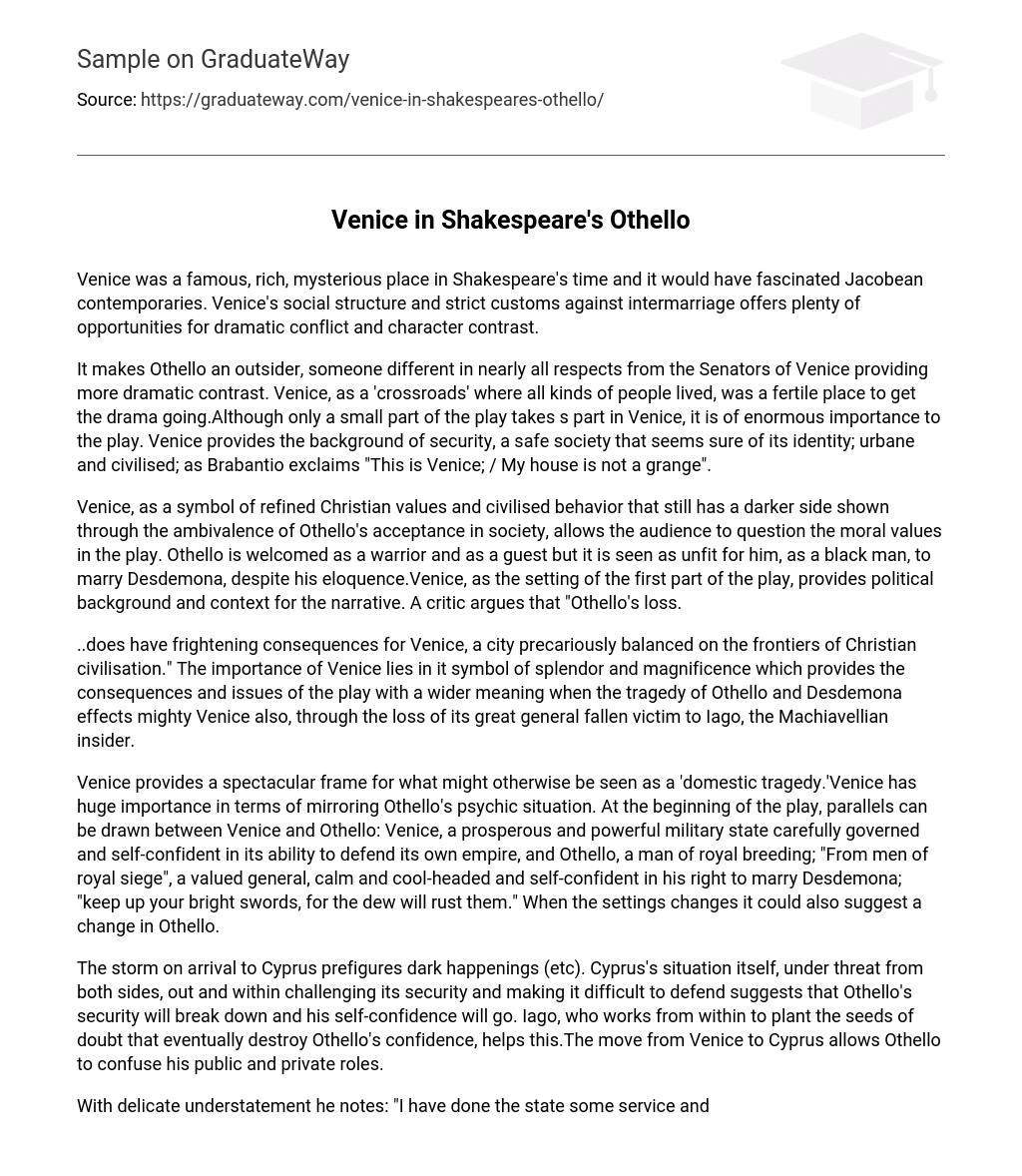Venice was a famous, rich, mysterious place in Shakespeare’s time and it would have fascinated Jacobean contemporaries. Venice’s social structure and strict customs against intermarriage offers plenty of opportunities for dramatic conflict and character contrast.
It makes Othello an outsider, someone different in nearly all respects from the Senators of Venice providing more dramatic contrast. Venice, as a ‘crossroads’ where all kinds of people lived, was a fertile place to get the drama going.Although only a small part of the play takes s part in Venice, it is of enormous importance to the play. Venice provides the background of security, a safe society that seems sure of its identity; urbane and civilised; as Brabantio exclaims “This is Venice; / My house is not a grange”.
Venice, as a symbol of refined Christian values and civilised behavior that still has a darker side shown through the ambivalence of Othello’s acceptance in society, allows the audience to question the moral values in the play. Othello is welcomed as a warrior and as a guest but it is seen as unfit for him, as a black man, to marry Desdemona, despite his eloquence.Venice, as the setting of the first part of the play, provides political background and context for the narrative. A critic argues that “Othello’s loss.
..does have frightening consequences for Venice, a city precariously balanced on the frontiers of Christian civilisation.” The importance of Venice lies in it symbol of splendor and magnificence which provides the consequences and issues of the play with a wider meaning when the tragedy of Othello and Desdemona effects mighty Venice also, through the loss of its great general fallen victim to Iago, the Machiavellian insider.
Venice provides a spectacular frame for what might otherwise be seen as a ‘domestic tragedy.’Venice has huge importance in terms of mirroring Othello’s psychic situation. At the beginning of the play, parallels can be drawn between Venice and Othello: Venice, a prosperous and powerful military state carefully governed and self-confident in its ability to defend its own empire, and Othello, a man of royal breeding; “From men of royal siege”, a valued general, calm and cool-headed and self-confident in his right to marry Desdemona; “keep up your bright swords, for the dew will rust them.” When the settings changes it could also suggest a change in Othello.
The storm on arrival to Cyprus prefigures dark happenings (etc). Cyprus’s situation itself, under threat from both sides, out and within challenging its security and making it difficult to defend suggests that Othello’s security will break down and his self-confidence will go. Iago, who works from within to plant the seeds of doubt that eventually destroy Othello’s confidence, helps this.The move from Venice to Cyprus allows Othello to confuse his public and private roles.
With delicate understatement he notes: “I have done the state some service and they know it”, and concludes his valediction with the tale of the Turk in Aleppo; Othello, the private man, having brought shame on the state, Othello, the dutiful soldier, must punish him.As much as he understands the political and military realities of Venice, Othello does not have an insider’s knowledge of its social etiquette, though he may have heard something of the license permitted in this fashionable city. So when Iago tells him that wives “let heaven see” what they do not show their husbands, and that it is unremarkable to be naked in bed with a friend “an hour or more, not meaning any harm”, Othello knows no differently.Venice provides a contrast to Cyprus, a “town of war” where the civilised values fall away and Iago and Othello are free to do as they wish.
Cyprus was a Venetian protectorate and the conflict between Christians and infidels: the historical background provides a context for the narrative. Virginia Mason Vaughan argues that “Othello’s loss …
does have frightening consequences for Venice, a city precariously balanced on the frontiers of Christian civilisation.”In contrast to Othello, Venice seems sure of its identity as the play begins – urbane and civilised; as Brabantio exclaims, “This is Venice; / My house is not a grange.”Caught in a liminal zone between Venice’s Christian civility and the Ottomite’s pagan barbarism is Cyprus, a Venetian colony under siege. Cyprus is the frontier, the uttermost edge of western civilisation, simultaneously vulnerable to attack from without and subversion within.
..Cyprus’s geographical and political position mirror Othello” psychic situation. Like Cyprus, Othello can be colonised by Venice – he can be put to use.
However, he can never become wholly Venetian. This liminal positioning makes him vulnerable to Iago’s wiles and, like Cyprus, if he is not fortified, he will “turn Turk.”The opposition of Venetian and Turk continues through the play, culminating in Othello’s final speech in which he ultimately conquers the threat presented by “a turbaned Turk.” According to Virginia Mason Vaughan ” the precariousness of a nation’s identity – not just an individual’s – lurks behind the tragedy of Othello and his wife.
“Venice was seen as a place of romance, with cultural values and yet also, as the birthplace of Niccolo Machiavelli (1469 – 1527), it was associated with poisonings and vice.Having established the importance of Othello’s public role in Venice in Act 1, the focus then narrows to concentrate on the private man. He is both surprised and overjoyed, expressing “wonder great as my content” that Desdemona has arrived before him. After the turmoil and uncertainty of his voyage, his emotional commitment to his marriage is reflected in “if it were now to die, / ‘Twere now to be most happy.
” In taking Othello and Desdemona to Cyprus, Shakespeare removes them from the social structure and security of the environment in which their love developed. The storm prefigures the discord and fragmentation to come, for the journey to Cyprus has forced a separation between Othello and Desdemona (parted by “foul and violent tempest.”





